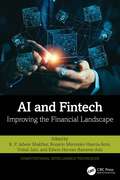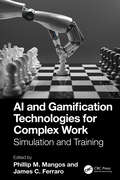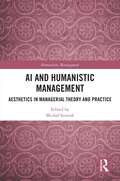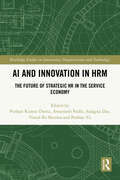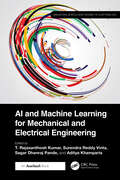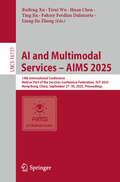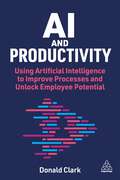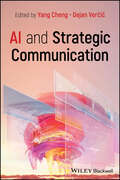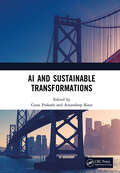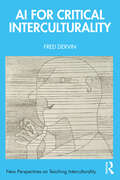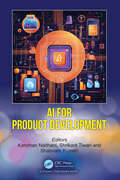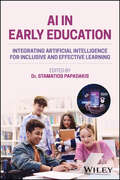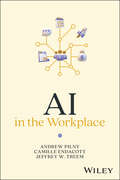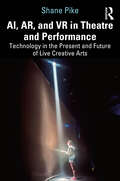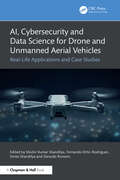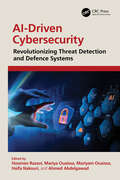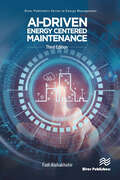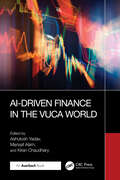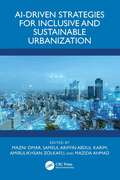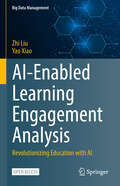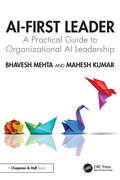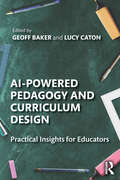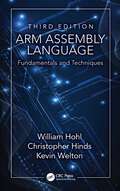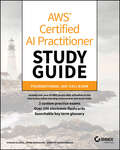- Table View
- List View
AI and Fintech: Improving the Financial Landscape (Computational Intelligence Techniques)
by Vishal Jain Jaheer Mukthar, K. P. Mercedes Huerta-Soto, Rosario Hernan Ramirez-Asis, EdwinThis book explores the transformative intersection of AI and Fintech. It encompasses an in-depth analysis of how AI is reshaping the financial industry, revolutionizing traditional practices, and paving the way for innovative solutions. It provides understanding of the symbiotic relationship between AI and Fintech, offering insights into the current state, future potential, challenges, and ethical considerations within this dynamic landscape. It addresses critical ethical considerations surrounding AI and Fintech, fostering a dialogue on responsible AI integration and data privacy.Features: Explains how AI is being used to automate tasks, improve efficiency, and reduce costs in the financial industry Covers improvement of risk management and fraud detection Includes the development of new financial products and services, such as robo-advisors and cryptocurrency trading platforms Explores the potential impact of AI on the financial industry, both positive and negative Discusses the ethical implications of using AI in the financial sector This book is aimed at researchers and professionals in computer engineering, AI, and Fintech.
AI and Gamification Technologies for Complex Work
by James C. FerraroThe medium through which training in the workplace is delivered has been changing in recent years to offer a more personalized and immersive experience. The invention of virtual reality (VR) and augmented reality (AR) platforms has created opportunities to take a more hands-on approach to familiarizing oneself with a task or environment with mitigated time and monetary commitments. Written assessments are being swiftly replaced with more interactive and scientifically validated training simulations and this essential technology is in high demand in the government and private sectors. This book highlights many of the ways simulation-based training can be leveraged to create personalized training curricula for those in high-risk careers and how it can be assessed successfully. AI and Gamification Technologies for Complex Work uncovers the use of artificial intelligence (AI) and machine learning (ML) for the purposes of creating adaptive, personalized training for individuals who work in complex jobs. It covers adaptive simulation-based training, fighting skill decay through game-based training, and additional uses of AI/ML and other tools in measuring human performance. Insights from professionals and experts in the fields of simulation and training provide readers with information about current applications of AI/ML in creating adaptive or personalized training, as well as investigations into the future of simulation and game-based training, as virtual and augmented realities proliferate modern training programs. The book looks at how data science, AI, and ML contribute to adaptive training systems and the reader is encouraged to look further into the engines that drive adaptive training while devising their own systems for training in complex jobs. This book is ideal for professionals in human factors engineering and psychology, artificial intelligence, military training and simulation, game development, data science, modeling and simulation and industrial and organizational psychology.
AI and Humanistic Management: Aesthetics in Managerial Theory and Practice (Humanistic Management)
by Michal SzostakThis book, situated at the intersection of humanistic management, aesthetics, and artificial intelligence (AI) studies, aims to explore how the emergence of AI-driven solutions reshapes managerial paradigms, alters human experiences within organisations, and redefines the values guiding leadership, communication, and organisational development. By adopting a cross-disciplinary and multi-paradigmatic perspective, the volume seeks not only to identify the opportunities AI presents for enhancing human dignity and creativity at work but also to critically examine the risks of dehumanisation, aesthetic homogenisation, and ethical displacement. In the contemporary discourse on management theory and practice, the accelerated integration of AI technologies has initiated profound transformations that challenge the traditional humanistic foundations of organisational life. While AI is often perceived primarily through the lens of operational efficiency, cost optimisation, and decision-making enhancement, it also raises fundamental questions about the aesthetic, ethical, and relational dimensions of management. In this context, the book’s critical research problem was formulated in the following manner: understanding how AI-driven aesthetics influence the humanistic character of management, under what conditions AI can serve human-centred goals rather than eroding them, and what long-term consequences AI integration may have for the emotional, ethical, and aesthetic dimensions of organisational life. Addressing these issues is essential for developing management practices that harmonise technological advancement with the humanistic values of autonomy, authenticity, empathy, and aesthetic experience.
AI and Innovation in HRM: The Future of Strategic HR in the Service Economy (Routledge Studies in Innovation, Organizations and Technology)
by Pushan Kumar Dutta Amarnath Padhi Sulagna Das Vinod Kr Sharma Poshan YuThis book provides a comprehensive blueprint for organizations to strategically leverage AI technologies and drive innovation in their HRM practices, enabling them to cultivate a future-ready workforce that can thrive in the service-centric marketplace. It weighs in on the challenges and opportunities brought forth by the convergence of AI and HRM in a rapidly evolving service economy.Drawing insights from management theory, organizational psychology, and technology studies, this multidisciplinary book explores how AI can augment and elevate various facets of strategic HRM, from talent acquisition and employee development to performance management and organizational culture enhancement. It offers a future-focused perspective on HRM's evolving role in shaping the workplace of tomorrow, emphasizing the pivotal role of AI in fostering organizational agility, innovation, and competitiveness. The international contributors delve into the unique challenges and opportunities presented by AI integration in service industry contexts, providing tailored strategies and best practices for effective adoption, as well as addressing ethical considerations and responsible governance of AI systems.This timely volume will be a valuable resource for scholars across human resource management, organizational management, and innovation and technology management. It will be useful to HR professionals, business leaders, and decision-makers in service-based organizations.
AI and Machine Learning for Mechanical and Electrical Engineering (Innovations in Intelligent Internet of Everything (IoE))
by Aditya Khamparia Sagar Dhanraj Pande T. Rajasanthosh Kumar Surendra Reddy VintaPractical and informative, AI and Machine Learning for Mechanical and Electrical Engineering examines how artificial intelligence (AI) is changing the status quo in mechanical engineering, electrical systems, and management. Real-world examples and case studies demonstrate the application of AI in such diverse settings as industry and policymaking. This book illustrates how AI is playing a crucial role in enhancing productivity and innovation in various industries. It discusses transition methods and the ethical implications of using AI in mechanical engineering. Chapter highlights include the following: Developing a smart algorithm to integrate fault detection and classification Algorithms to investigate different testing scenarios for various anomalies in electric motors Data fusion to detect and assess electromechanical damage Neural networks for rolling bearing fault diagnosis Evolutionary algorithms to optimize deep learning models for water industry forecasts AI-based anomaly detection and root-cause analysis An overarching theme is the transition from traditional mechanical, electrical, and management systems to AI-enabled smart systems. The book helps readers make sense of the challenges of integrating smart systems. It equips engineers with theoretical understanding as well as insight based on hands-on expertise. It shows how to better link and automate systems and improve productivity. This book not only shows how to implement smart solutions now but also shows the way to a more intelligent, productive, and interconnected future.
AI and Multimodal Services – AIMS 2025: 14th International Conference, Held as Part of the Services Conference Federation, SCF 2025, Hong Kong, China, September 27–30, 2025, Proceedings (Lecture Notes in Computer Science #16151)
by Liang-Jie Zhang Ruifeng Xu Huan Chen Ting Jin Yirui Wu Fahmy Ferdian DalimartaThis book constitutes the refereed proceedings of the 14th International Conference on AI and Multimodal Services – AIMS 2025, held as Part of the Services Conference Federation, SCF 2025, in Hong Kong, China, during September 27–30, 2025. The 9 full papers included in this book were carefully reviewed and selected from 22 submissions. They focus on for the development, publication, discovery, orchestration, invocation, testing, delivery, certification, and management of artificial intelligence (AI) and multimodal applications and services.
AI and Productivity: Using Artificial Intelligence to Improve Processes and Unlock Potential
by Donald ClarkIs AI in your organization driving real productivity or creating costly distractions? AI and Productivity by Donald Clark is a strategic guide for senior leaders and people executives who want to harness artificial intelligence to improve efficiency, strengthen workforce capability and protect long-term business performance.Written by a leading industry voice, this book provides proven tools for assessing where AI genuinely adds value, and where it risks undermining skills, curiosity and critical thinking. It addresses the unstructured, rapid adoption of AI, offering governance-led approaches to integrate it effectively across recruitment, HR and Learning and Development. You'll discover how to: - Identify high-impact AI applications that align with strategic objectives - Avoid productivity loss from poorly targeted AI implementation - Safeguard employee learning, problem-solving and communication skills - Balance efficiency gains with talent development and cultural health With real-world insights and practical frameworks, AI and Productivity equips senior decision-makers to ensure AI adoption delivers measurable results while sustaining the human capabilities essential for future success.Themes include: AI strategy, governance, workforce capability, productivity, talent development
AI and Strategic Communication
by Yang Cheng Dejan VerčičProvides an essential guide to AI's impact on PR practices, ethics, and societal implications As AI technologies continue to evolve, communication professionals must understand their profound effects on media relations, activism, and digital engagement. AI and Strategic Communication: Navigating the Future offers a comprehensive exploration of AI's role in reshaping public relations, bringing together contributions from leading scholars and practitioners from 9 countries across 5 continents, with representation from Europe, North America, Oceania, and Asia, this comprehensive volume addresses the ethical implications, challenges, and opportunities AI presents for individuals, organizations, and society. Covering topics such as AI-driven crisis communication, algorithmic bias, and human-robot interactions, the authors provide both theoretical frameworks and actionable strategies to help readers navigate the AI-driven landscape. The book is structured into three distinct sections, each addressing AI's impact at different levels of communication, including individual, professional and organizational, and society levels. The opening section explores personal experiences with AI, followed by an examination of AI's transformative role in public relations and strategic communication, including crisis management, employee communication, and AI-augmented content creation. The concluding section delves into the broader implications of AI on democracy, media ethics, and cultural biases. Offering expert guidance for integrating AI tools responsibly while addressing privacy concerns and ethical dilemmas, AI and Strategic Communication: Presents cutting-edge research from experts in AI, PR, and media ethics Discusses emerging AI-driven technologies and their implications for PR professionals Discusses AI's impact on democracy, misinformation, and truth in public discourse Includes a forward-looking analysis of AI's evolving role in communication Offers recommendations for future research and professional adaptation Features research-backed insights, practical strategies, and real-world case studies With a multidisciplinary approach to communication in the digital age, AI and Strategic Communication: Navigating the Future is essential reading for students, educators, and industry professionals looking to stay ahead in the evolving field of strategic communication. It is an ideal textbook for undergraduate and postgraduate courses on digital communication and social media, communication ethics and technology, advanced public relations, and strategic communication.
AI and Sustainable Transformations
by Gyan Prakash Amandeep KaurAI and Sustainable Transformations presents cutting-edge research and insights into the role of Artificial Intelligence (AI) and emerging technologies in driving human-centered innovation and sustainable transformation across various industries.With an emphasis on aligning technological advancements with sustainable practices, this book explores applications of AI in manufacturing, healthcare and the food industry, it delves into critical themes such as Internet of Things-enabled smart manufacturing, blockchain for secure industrial ecosystems, emerging technologies for sustainable futures, intelligent healthcare systems, AI for sustainable and healthcare supply chains, and applications of AI in the food industry. Through in-depth case studies, technical analyses and alternative solutions, readers will gain a broad-based perspective on AI-driven human-centric development.This is an essential resource for academics, researchers, professionals and policy makers who wish to leverage innovative strategies for a better tomorrow.
AI for Critical Interculturality (New Perspectives on Teaching Interculturality)
by Fred DervinProvocative, interdisciplinary, and daringly critical, AI for Critical Interculturality doesn’t spoon-feed ready-made answers but rather inspires readers to think, question and interrogate interculturality alongside AI. In a world where AI is often feared as a threat to human intelligence and creativity, the book flips the script by positioning AI as a valuable partner in the study of interculturality as both a scientific and educational notion. How could AI help us dismantle biases, interrogate knowledge production/dissemination and foster deeper self-reflexivity in the broad field of Intercultural Communication Education and Research? What happens when we treat AI not as a passive tool but as an active interlocutor – one that mirrors our ideological blind spots and pushes us toward sharper criticality and reflexivity? Through rich theoretical and conceptual insights, real-world cases and interactive activities, this book equips readers to unmask ideologies in AI-generated knowledge about interculturality; leverage AI as a mirror to expose and confront personal and systemic biases; consider some language stratagems to disrupt linguistic norms in human-AI dialogue. More importantly, the author asks us to forge an ethical and non-utilitarian partnership with AI. This boundary-shattering work invites students, educators and researchers of interculturality to envision and co-create the future of intercultural studies.
AI for Product Development
by Shrikant Tiwari Kanchan Naithani Shabnam KumariAI for Product Development explores the transformative role of artificial intelligence in reshaping modern industries. This book offers a comprehensive guide, spanning the evolution of AI in product innovation to practical applications, such as clustering techniques, human-autonomous vehicle interactions, and personalized healthcare solutions. With contributions from leading researchers, it covers explainable AI, real-world case studies, and ethical considerations in intelligent systems. The chapters delve into cutting-edge topics such as YOLO model variants, AI-driven emotion detection, and strategies for overcoming AI implementation challenges. Designed for researchers, professionals, and students, it bridges theory and practice, emphasizing AI's profound impact on product development and beyond.
AI in Early Education: Integrating Artificial Intelligence for Inclusive and Effective Learning
by Stamatios PapadakisAn original and up-to-date examination of how to use AI to improve pre-school and early childhood education In AI in Early Education: Integrating Artificial Intelligence for Inclusive and Effective Learning, examines how to use artificial intelligence technology to enhance teaching and learning with personalized learning pathways, inclusive instructional practices, and increased student engagement. The book explores key themes, like AI literacy for young learners, ethical and pedagogical considerations, and the professional development that educators need to effectively integrate these tools into their classrooms. You'll also find: Ways to use AI to support diverse learners, including those with special educational needs Hands-on strategies that offer educators clear, practical ways to bring AI tools into the classroom A careful emphasis on inclusion strategies, demonstrating how AI can help tailor learning experiences to meet the needs of all students Perfect for educators, teacher trainers, researchers, regulators, and policymakers interested in how artificial intelligence might contribute to the improvement of early childhood and primary education, AI in Early Education is also a must-read for pre-service and in-service teachers and professionals involved in curriculum development and inclusive education.
AI in the Workplace
by Andrew Pilny Jeffrey W. Treem Camille EndacottOffers a smart, witty guide to understanding AI's role in the future of work With AI tools now integrated into everything from hiring systems and team collaboration platforms to strategic decision-making processes, there’s a pressing need to move beyond either fear or hype. AI in the Workplace explores how artificial intelligence is reshaping organizational life, often in ways that are subtle yet deeply consequential. This book answers that need by providing an accessible, critical, and often humorous guide for understanding what AI is, how it works, and what it means for the ways we work and interact in professional settings. AI in the Workplace demystifies AI through a blend of theory, storytelling, and practical insight. Readers are introduced to foundational AI concepts without overwhelming technical detail and are given frameworks to think through pressing questions of algorithmic management, workplace surveillance, bias, and ethics. Through contemporary case studies, real-world examples, reflective exercises, and actionable strategies, the book equips readers to think critically and act thoughtfully in the evolving AI landscape, whether that means embracing tools, resisting trends, or something in between. Helping readers grasp how AI is not simply replacing human labor, but reorganizing work itself, AI in the Workplace: Introduces the novel Human-Story-Text-AI Network model to conceptualize AI's integration into organizational life Examines algorithmic management through a critical lens to offer a fresh perspective on emerging managerial practices Discusses overlooked issues such as bias in training data and the sociopolitical dimensions of data-centric AI Includes hands-on thought experiments at the end of each chapter to stimulate discussion and critical thinking Explores “Singularity Management” and the implications of AI on human roles, ethics, and empathy in organizations Offers a five-part framework (the ”5 Es”) to guide ethical and strategic decision-making in AI-driven environments Provides a strategy that balances innovation and safety for regulating AI in the workplace Perfect for students and professionals alike, AI in the Workplace serves advanced undergraduate and graduate courses in Communication, Business, Technology Management, and related fields. It is also an invaluable resource for executive education and professional development in AI adoption, leadership, and organizational change.
AI, AR, and VR in Theatre and Performance: Technology in the Present and Future of Live Creative Arts
by Shane PikeAI, AR, and VR in Theatre and Performance investigates the cutting-edge application of evolving digital technologies within the creative industries, with a focus on theatre and the dramatic arts.Grounded in a practice-based approach, this book explores the experiences of creatives, producers, and IT-specialist content creators employing artificial intelligence (AI), augmented reality (AR), and virtual reality (VR) technologies. A series of international case studies are presented, demonstrating current techno-infused practices, as well as potential futures for these technologies within the broadest of creative contexts. Framed by a rigorous ethnodramatic methodological approach, the book examines the practical applications of contemporary digital technologies in theatre and other live performance settings and provides a scaffolding framework for readers to adopt in their own practice. It also proposes groundbreaking ideas for the classification of how AI may be used in current and future artistic practices, the ‘three Cs of AI,’ and introduces the concept of Communal Augmented Reality – Live (CARL) as the most likely form to advance the incorporation of emerging technologies onto the live stage. The works of Belgium’s VR immersive experiences company CREW, Singapore-based film and visual artist Ho Tzu Nyen, and the Tamil language theatre company AGAM Theatre Lab are detailed alongside the world-first application of AR holographic technology in Australia, before unpacking the pioneering advancements in algorithmic and AI theatre of America’s Annie Dorsen.With a practice-based, artist-led perspective and contributions from technologists, this book offers a comprehensive and accessible resource that will appeal to a diverse audience of artists, academics, students, practitioners, creative engineers/content creators, animators, and theorists with an interest in the relationship between digital technologies and live performance.
AI, Cybersecurity and Data Science for Drone and Unmanned Aerial Vehicles: Real-Life Applications and Case Studies
by Shishir Kumar Shandilya, Fernando Ortiz-Rodriguez, Smita Shandilya and Gerardo RomeroThis book explores the transformative impact of drone technology and unmanned aerial systems (UAS) across diverse industries, from precision agriculture and logistics to disaster response and forensic investigations. It highlights how the integration of Artificial Intelligence (AI) into UAVs is addressing contemporary challenges, optimizing operations, and shaping the future of aerial systems. It offers technical methodologies, case studies, and a detailed roadmap for integrated drone forensics, making it an essential resource for understanding the dynamic sector of Intelligent Aerial Systems. Examines the integration of AI in drones and UAS, enhancing operational efficiency and investigative processes Covers the evolving landscape of drone technology, including swarms, autonomous systems, and forensic methodologies Focuses on specific sectors such as agriculture, logistics, and disaster response, offering practical insights, real-life examples, and future scenarios Explores the role of drones in delivery and logistics, transforming transportation systems by improving efficiency and reducing costs Explains the use of drones for public safety, smart city disaster response, and forensic investigations, providing critical insights for emergency operations This reference book serves as a comprehensive guide for professionals, researchers, and scholars interested in the rapidly advancing world of drone technology.
AI-Driven Cybersecurity: Revolutionizing Threat Detection and Defence Systems
by Ahmed Abdelgawad Mariya Ouaissa Mariyam Ouaissa Hooman Razavi Haïfa NakouriThis book delves into the revolutionary ways in which AI-driven innovations are enhancing every aspect of cybersecurity, from threat detection and response automation to risk management and endpoint protection. As AI continues to evolve, the synergy between cybersecurity and artificial intelligence promises to reshape the landscape of digital defence, providing the tools needed to tackle complex, ever-evolving cyber threats. Designed for professionals, researchers, and decision-makers, this book emphasizes that understanding and leveraging AI in cybersecurity is not just advantageous—it is essential for building robust, future-proof defences in a world where digital security is paramount.
AI-Driven Energy Centered Maintenance (River Publishers Series in Energy Management)
by Fadi AlshakhshirThis third edition provides a comprehensive update and expansion on the principles and practices of Energy-Centered Maintenance (ECM). It combines advanced concepts with actionable strategies to enhance equipment energy efficiency, reliability, and availability. By integrating cutting-edge developments in artificial intelligence, machine learning, and predictive maintenance, the book offers a modernized approach to facility management that aligns with digital transformation trends. Designed as a self-study guide and reference for energy engineers, facility managers, and maintenance professionals, this edition provides invaluable knowledge on data-driven and AI-driven maintenance strategies, energy performance optimization, and the integration of smart technologies into maintenance planning. Through practical insights, case studies, and real-world applications, it emphasizes sustainability, operational excellence, and cost-efficiency. Tailored for engineers, facility managers, students, and decision-makers, this edition equips readers with the tools and knowledge needed to implement ECM effectively in modern facilities. It bridges theoretical foundations with real-world applications, demonstrating ECM’s critical role in reducing energy consumption, enhancing equipment performance, and supporting sustainable, AI-driven facility management practices.
AI-Driven Finance in the VUCA World
by Mansaf Alam Kiran Chaudhary Ashutosh YadavIn today’s world, characterized by volatility, uncertainty, complexity, and ambiguity (VUCA), traditional finance is no longer sufficient to meet the challenges of fast-paced and interconnected global markets. To thrive in this dynamic environment, financial institutions, professionals, and policymakers are increasingly turning to AI. AI-Driven Finance in the VUCA World explores how AI is becoming ever more critical in the financial industry.This book looks at the impact of AI on investment strategies. AI-powered algorithms exhibit the capacity to scrutinize extensive datasets to unveil masked patterns and investment opportunities. From quantitative trading algorithms adept at capitalizing on market inefficiencies to robot-advisors offering individualized investment counsel, AI profoundly reconfigures the investment landscape. In a VUCA world, risk management is paramount, and regulatory scrutiny is tighter than ever. AI’s ability to assess risks in real time is critical in identifying anomalies and predicting potential crises. The book examines how AI enhances risk assessment, fraud detection, and compliance to provide institutions with a proactive edge in safeguarding operations and assets. This text also looks at the following: AI-driven chatbots, virtual assistants, and recommendation engines that revolutionize customer interactions, enhance engagement, and improve retention rates The ethical challenges surrounding AI in finance, including bias in algorithms, data privacy, and the responsible use of AI Case studies on how AI can solve specific industry challenges and drive innovation The future of finance is intertwined with AI, and this book looks to this future by discussing emerging trends and possibilities. It explores the potential of quantum computing in finance, the role of AI in sustainability and ESG investing, and the implications of AI-powered regulatory technologies. Seeking to provide valuable insights for financial professionals, the book is equally valuable to researchers, policymakers, and anyone interested in the future of finance. It bridges the gap between theory and practice, offering actionable insights that can be immediately applied in the real world.
AI-Driven Strategies for Inclusive and Sustainable Urbanization
by Mazni Omar Amirulikhsan Zolkafli Mazida Ahmad Karim, Samsul Ariffin AbdulThis book explores the transformative potential of artificial intelligence (AI) in reshaping urban development practices. Its objective is to provide a comprehensive overview of the latest advancements in AI‑driven strategies for urban development and governance, with a focus on promoting inclusivity, sustainability, and resilience in cities worldwide. This book studies how AI technologies can be utilized to tackle the complex challenges encountered in urban areas, spanning ethical, social, and environmental implications across urban governance and beyond.The in‑depth analysis in this book uncovers the potential of AI in addressing longstanding challenges and seizing new opportunities in urban contexts, offering insights into wide‑ranging applications. For the use of AI in urban planning, the authors showcase applications that help reduce environmental impact while enhancing accessibility for underserved communities by analyzing real‑time data on land use, transportation, and population needs. Another topic in this book examines AI‑powered urban mobility systems, utilizing software that integrates real‑time data to create adaptive transportation networks. These systems offer efficient, eco‑friendly travel solutions tailored to diverse populations, including individuals with disabilities, by dynamically adjusting routes and services. Additionally, this book delves into digital inclusion and accessible technologies in smart cities, highlighting software that prioritizes accessibility and digital inclusion, ensuring that all residents, regardless of ability, can fully participate in urban life. The interdisciplinary approach allows readers to understand how different fields, such as technology, urban planning, and social policy, intersect and shape AI‑driven urban development. By weaving together insights from these diverse areas, this book demonstrates how AI can address real‑world challenges, from improving infrastructure to fostering sustainability and inclusivity in cities. This perspective helps readers grasp the broader impact of AI, showing how it can enhance various aspects of urban life, including social equity and environmental resilience.Through interdisciplinary research, case studies, and expert insights, this book aims to educate students in higher learning and inspire policymakers, urban planners, and practitioners to leverage AI technologies in addressing urban challenges and build better cities for all residents.
AI-Enabled Learning Engagement Analysis: Revolutionizing Education with AI (Big Data Management)
by Zhi Liu Yao XiaoArtificial Intelligence (AI) is revolutionizing the education industry, particularly in understanding and enhancing student learning engagement in online learning. The book aims to get an in-depth exploration into a three-stage framework of AI-enabled learning engagement analysis, which provides effective tools and methodologies for education researchers and practitioners, facilitating intelligent transformation and optimization. It delves into intelligent recognition, including emotional and cognitive engagement, supported by detailed algorithmic introductions and case studies. The book further examines the relationship between engagement and outcomes, covering cognition, emotion, self-regulation, and social network characteristics. Furthermore, it presents adaptive interventions, offering a comprehensive guide to leveraging AI for personalized learning experiences and improved learning outcomes. The book provides valuable insights and practical tools for enhancing teaching and learning outcomes. Whether you are an educator seeking to integrate AI into your teaching strategies or a researcher exploring the frontiers of educational technology, this book equips you with the knowledge and resources to navigate the evolving landscape of AI-enabled education. This publication underscores the significance of practical applications, presenting a compendium of pioneering research methodologies and case studies that elucidate the integration of AI and data analytics within pedagogical contexts. Whether the objective is to refine comprehension of online learning engagement dynamics or to deploy AI-infused strategies in educational settings, this text serves as an invaluable resource for revolutionizing education with AI. Chapter 2 is available for open access under a Creative Commons Attribution 4.0 International License via link.springer.com.
AI-First Leader: A Practical Guide to Organizational AI Leadership
by Mahesh Kumar Bhavesh MehtaAI-First Leader: A Practical Guide to Organizational AI Leadership is a practical guide for executives, technology leaders, and decision- makers seeking to turn artificial intelligence into a strategic advantage. As AI rapidly reshapes how organizations operate and compete, this book provides a clear roadmap from initial awareness to enterprise-wide adoption. It equips leaders with the tools to navigate both the promise and complexity of today’s AI landscape, including machine learning, generative AI, and autonomous systems.Blending technical clarity with strategic insight, the book is anchored in real-world frameworks and brought to life through the fictional yet highly realistic case study of NovaBridge Health, a mid-sized healthcare system navigating the risks and rewards of AI transformation. Through this narrative, readers gain firsthand insights into overcoming early missteps, building trust, aligning AI systems with KPIs, and scaling responsibly in regulated environments. Topics span foundational and advanced concepts, from data governance, model evaluation, and prompt engineering to the deployment of AI agents, resilient infrastructure, and responsible AI practices. Actionable insights, decision frameworks, and sector-specific examples help leaders bridge the gap between innovation and execution.Written for CEOs, CTOs, product managers, and innovation leads, AI-First Leader: A Practical Guide to Organizational AI demystifies AI without diluting its complexity. Whether you’re building your first chatbot, deploying generative search and co-pilots, or shaping guardrails for enterprise-wide use, this book provides the blueprint to lead with AI strategically, responsibly, and at scale.
AI-Powered Pedagogy and Curriculum Design: Practical Insights for Educators
by Geoff Baker Lucy CatonAI-Powered Pedagogy and Curriculum Design offers practical insights and guidance on the effective integration of AI tools into teaching practices and curriculum design. While numerous claims exist as to the validity and authenticity of the applications of AI in schools, too little attention has been paid to empirical research conducted with and by teachers in real-world classrooms. This book synthesises diverse viewpoints from teacher educators across disciplines and levels toward a comprehensive, context-specific understanding of the challenges and best practices for responsibly leveraging Generative AI to enhance outcomes in classrooms. Contributors further shed light on how Generative AI can align with standards, assessment practices, and teacher training programs in different settings. Firsthand classroom experiences and experimental approaches of educators in the United Kingdom and Europe will provide current and aspiring teachers with insights into the intersection between AI and teacher empowerment, student participation, ethical implications, and socially just approaches.
ARM Assembly Language: Fundamentals and Techniques
by William Hohl Christopher Hinds Kevin WeltonARM Assembly Language: Fundamentals and Techniques, Third Edition explains in clear terms how ARM processors are programmed at the most fundamental level. While earlier editions covered much older architectures, the Third Edition moves entirely into the Cortex-M space, using the Armv8-M instruction set to illustrate how assembly code for the most modern Arm processors is written. Even if you are writing in JavaScript, Python, C++, C#, or Rust, these high-level programming languages require a compiler or interpreter to transform the code into machine-executable instructions, so software and hardware engineers will gain valuable insight into how their code is executing from knowing how the underlying processor functions.Featuring chapters updated to Armv8-M throughout this book, this edition: Moves all examples into the Keil MDK environment, which uses armclang and a GNU-like syntax that is very popular in the industry Includes an appendix that helps students set up the Keil tools for use throughout this book Describes the IEEE 754 floating-point arithmetic supported by the Armv8-M processors implementing the optional Floating-Point Unit (FPU) Features an updated chapter on mixing C and assembly code together Discusses features and concepts found in the most advanced Arm processors, such as the Cortex-A and Cortex-X families using Armv9 architectures Written by authors who each have more than 35 years of experience in the semiconductor industry, ARM Assembly Language: Fundamentals and Techniques, Third Edition makes an ideal textbook for students wanting to learn about microprocessors but who may possess only a basic knowledge of programming and logic.
AWS Certified AI Practitioner Study Guide: Foundational (AIF-C01) Exam (Sybex Study Guide)
by Shreyas Subramanian Vikram Elango Vivek GangasaniQuickly and intelligently prepare for the AIF-C01 exam and succeed in your first role as an AWS AI practitioner In AWS Certified AI Practitioner Study Guide: Foundational (AIF-C01) Exam, a team of veteran AWS and AI specialists walks you through an efficient and effective path to success on the challenging AIF-C01 exam. You'll demonstrate your knowledge and effectiveness with artificial intelligence (AI) and machine learning (ML), generative AI technologies, and their associated AWS services and tools, independent of any specific job role or industry title. You'll discover how to understand the appropriate uses of AI, ML, and generative AI technologies, when to use the various products and tools available, and how to ask relevant questions within your organization. The book covers the fundamentals of AI, ML, and generative AI, applications of foundation models, guidelines for responsible AI use, and security, compliance, and governance for AI solutions. Inside the book: Complimentary access to the online Sybex learning environment, including practice tests and exams, chapter review questions, flashcards, and a searchable key term glossary Material to help you become familiar with Amazon Web Services tools, including EC2, S3, Lambda, and SageMaker Explanations of Amazon Web Services infrastructure, including discussions of AWS regions, availability zones, and edge locations Perfect for anyone interested in building AI/ML solutions on Amazon Web Services, AWS Certified AI Practitioner Study Guide is a must-read resource for everyone planning to take the AIF-C01 exam, as well as those interested in working—or already working—in this dynamic and exciting field.
Aboriginal and Torres Strait Islander School Teachers and Australian Settler Colonialism: A History (Routledge Studies in Educational History and Development in Asia)
by Kay WhiteheadThis book addresses the gap in our historical knowledge about the roles Aboriginal and Torres Strait Islander teachers have played in Australia's history of school education. To date, there are few references to schooling in histories of Indigenous Australians, and Australian histories of Indigenous education and teacher education omit Indigenous teachers until systemic initiatives were introduced to recruit and qualify them in the 1970s. This book reinstates and honours Aboriginal and Torres Strait Islander people who worked as school teachers from invasion to contemporary state school systems.The book is structured chronologically to explore Aboriginal and Torres Strait Islander teachers' lives and work in relation to settler colonial policies of segregation and protection, assimilation and self-determination; and education policy and practice. The chapters span the nineteenth century to contemporary times and show the systemic challenges Indigenous people faced in becoming qualified teachers and joining the profession. Stories of Aboriginal and Torres Strait Islander teachers from different geographic regions, communities and historical periods foreground their agency including their political activism and take account of localised cultural and education contexts.This insightful book is recommended for upper-level undergraduates and academics in Indigenous education, history of education, teacher education and teachers' work. It will also appeal to readers with a general interest in Australian Indigenous history.
